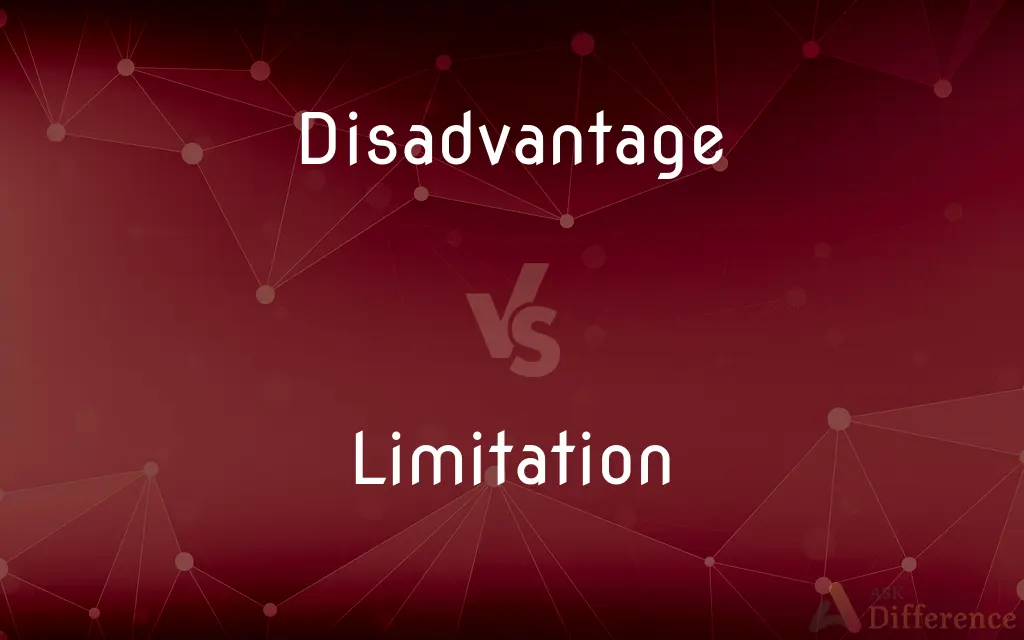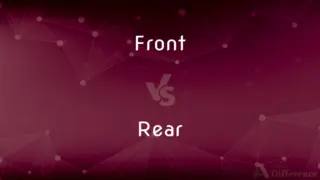Disadvantage vs. Limitation — What's the Difference?
By Fiza Rafique & Maham Liaqat — Updated on March 13, 2024
A disadvantage is a drawback or an unfavorable condition that reduces effectiveness, while a limitation is a restriction or boundary that defines the scope or extent of something.

Difference Between Disadvantage and Limitation
Table of Contents
ADVERTISEMENT
Key Differences
Disadvantages often refer to inherent negative traits or conditions that lower the value, effectiveness, or desirability of something. For example, a disadvantage of living in a high-rise building might be the lack of personal outdoor space. Limitations, on the other hand, are more about constraints or caps that limit the capacity, range, or extent of abilities, actions, or functionalities. For instance, a limitation of a study might be its small sample size, which constrains the generalizability of its findings.
While disadvantages can sometimes be mitigated or overcome, limitations are often fixed boundaries that are more difficult to change. For example, the disadvantage of poor public transport connectivity can be addressed by developing infrastructure, whereas the limitation of human lifespan sets a natural boundary that is currently insurmountable by technology.
Disadvantages are usually used in a comparative sense, highlighting a less favorable position relative to something else. In contrast, limitations are often stated as inherent qualities or conditions that define the parameters within which something operates. This distinction is crucial in research and development, where identifying limitations is essential for understanding the scope of findings or the applicability of technology.
In practical applications, addressing disadvantages typically involves strategic planning and resource allocation to minimize negative impacts. Addressing limitations, however, usually requires a reevaluation of fundamental assumptions or a redesign to extend capabilities beyond current boundaries.
Both terms play a significant role in decision-making processes. Understanding the disadvantages and limitations of various options helps in making informed choices by weighing the drawbacks and recognizing the boundaries of each alternative.
ADVERTISEMENT
Comparison Chart
Definition
An unfavorable condition reducing effectiveness or desirability.
A restriction or boundary limiting scope, extent, or functionality.
Nature
Inherent negative trait or condition.
Constraint or cap defining parameters.
Mitigation
Can often be overcome or mitigated.
More fixed; difficult to change.
Comparative Aspect
Used to highlight a less favorable position relative to others.
Defines parameters within which something operates.
Contextual Application
Strategic planning and resource allocation to minimize impacts.
Reevaluation of assumptions or redesign to extend capabilities.
Role in Decision-Making
Helps in identifying less favorable options.
Helps in understanding the scope and applicability.
Compare with Definitions
Disadvantage
A drawback that reduces desirability.
A major disadvantage of living in a rural area is limited access to healthcare.
Limitation
A restriction on capacity or extent.
The phone's storage capacity is a limitation for users needing lots of space.
Disadvantage
A condition hindering success or efficiency.
A disadvantage of traditional publishing is the lengthy process from manuscript to bookshelf.
Limitation
A boundary defining the scope.
The study's limitation is its focus on a single demographic.
Disadvantage
An unfavorable aspect in comparison.
The disadvantage of early adoption is often dealing with unresolved technical issues.
Limitation
A fixed condition that cannot be easily changed.
A fundamental limitation of this software is its incompatibility with other operating systems.
Disadvantage
A negative feature impacting performance.
The car's heavy weight is a disadvantage in terms of fuel efficiency.
Limitation
A constraint on functionality or applicability.
The limitation of this policy is that it only applies to urban areas.
Disadvantage
An obstacle to achieving goals.
Lack of funding is a significant disadvantage for startups.
Limitation
A rule or condition that confines possibilities.
The treaty imposed limitations on the number of troops each country could have.
Disadvantage
In policy debate, a disadvantage (abbreviated as DA, and sometimes referred to as: Disad) is an argument that a team brings up against a policy action that is being considered. A disadvantage is also used in Lincoln Douglas Debate.
Limitation
The act of limiting or the state of being limited
He was very successful in his limitation of salt intake.
Disadvantage
An unfavorable condition or position
Students who are at a disadvantage because they don't own computers.
Limitation
A limiting rule or condition; a restriction
Are there any limitations on the agreement?.
Disadvantage
Something that places one in an unfavorable condition or position
A disadvantage to living there is that you'd have no access to public transportation.
Limitation
A shortcoming or defect
We need to overcome our limitations if we want to succeed.
Disadvantage
Damage or loss, especially to reputation or finances; detriment
High gasoline prices have worked to the company's disadvantage.
Limitation
(Law) A period established by statute during which a lawsuit or criminal prosecution must be initiated.
Disadvantage
To put at a disadvantage; hinder or harm.
Limitation
The act of limiting or the state of being limited.
Disadvantage
A weakness or undesirable characteristic; a con.
The disadvantage to owning a food processor is that you have to store it somewhere.
Limitation
A restriction; a boundary, real or metaphorical, caused by some thing or some circumstance.
Getting into his wheelchair after his amputation, it felt like a limitation you could roll in.
He understood the exam material, but his fear was a limitation he could not overcome.
Disadvantage
A setback or handicap.
My height is a disadvantage for reaching high shelves.
Limitation
An imperfection or shortcoming that limits something's use or value.
Disadvantage
Loss; detriment; hindrance.
Limitation
(law) A time period after which some legal action may no longer be brought.
The lawyer obtained impunity by dragging his obviously guilty client's case beyond the ten-year limitation.
Disadvantage
(transitive) To place at a disadvantage.
They fear it might disadvantage honest participants to allow automated entries.
Limitation
The act of limiting; the state or condition of being limited; as, the limitation of his authority was approved by the council.
They had no right to mistake the limitation . . . of their own faculties, for an inherent limitation of the possible modes of existence in the universe.
Disadvantage
Deprivation of advantage; unfavorable or prejudicial quality, condition, circumstance, or the like; that which hinders success, or causes loss or injury.
I was brought here under the disadvantage of being unknown by sight to any of you.
Abandoned by their great patron, the faction henceforward acted at disadvantage.
Limitation
That which limits; a restriction; a qualification; a restraining condition, defining circumstance, or qualifying conception; as, limitations of thought.
The cause of error is ignorance what restraints and limitations all principles have in regard of the matter whereunto they are applicable.
Disadvantage
Loss; detriment; hindrance; prejudice to interest, fame, credit, profit, or other good.
They would throw a construction on his conduct, to his disadvantage before the public.
Limitation
A certain precinct within which friars were allowed to beg, or exercise their functions; also, the time during which they were permitted to exercise their functions in such a district.
Disadvantage
To injure the interest of; to be detrimental to.
Limitation
A limited time within or during which something is to be done.
You have stood your limitation, and the tribunesEndue you with the people's voice.
Disadvantage
The quality of having an inferior or less favorable position
Limitation
A certain period limited by statute after which the claimant shall not enforce his claims by suit.
Disadvantage
Put at a disadvantage; hinder, harm;
This rule clearly disadvantages me
Limitation
A principle that limits the extent of something;
I am willing to accept certain restrictions on my movements
Limitation
The quality of being limited or restricted;
It is a good plan but it has serious limitations
Limitation
The greatest amount of something that is possible or allowed;
There are limits on the amount you can bet
It is growing rapidly with no limitation in sight
Limitation
(law) a time period after which suits cannot be brought;
Statute of limitations
Limitation
An act of limiting or restricting (as by regulation)
Common Curiosities
What is a disadvantage?
A drawback or negative aspect that reduces effectiveness, desirability, or success.
Are limitations always permanent?
While some limitations can be extended or redefined, others are more inherent and fixed.
What is a limitation?
A restriction, boundary, or condition that limits the scope, extent, or functionality of something.
Can disadvantages be overcome?
Yes, disadvantages can often be mitigated or overcome with effort, resources, or strategic changes.
Can a limitation also be a disadvantage?
Yes, a limitation can be viewed as a disadvantage if it negatively impacts the desirability or effectiveness of something.
How can limitations be addressed?
By reevaluating underlying assumptions, redesigning to expand capabilities, or adjusting the scope to match the limitations.
How do disadvantages affect decision-making?
They highlight less favorable aspects of options, influencing choices by identifying potential drawbacks.
How do limitations affect the usability of a product?
They can confine the product's use to certain conditions, environments, or user groups.
Why are limitations important in research?
They define the scope and applicability of findings, ensuring accurate interpretation and application of results.
Do all projects or products have limitations?
Yes, virtually all projects and products have limitations due to resource constraints, technological boundaries, or specific design choices.
Are limitations always negative?
Not necessarily; they can provide a clear framework or focus, which can be beneficial in guiding efforts and maintaining clarity.
Is identifying disadvantages and limitations important in planning?
Yes, recognizing both helps in preparing for potential challenges and defining the feasible range of actions or expectations.
Can technological advancements reduce limitations?
Yes, advancements can push back previous boundaries, but new limitations may also emerge.
Can a disadvantage be turned into an advantage?
In some contexts, what is seen as a disadvantage can be leveraged or reframed as a unique feature or selling point.
How do businesses deal with disadvantages and limitations?
Businesses often conduct SWOT analyses to identify and strategize around their disadvantages and limitations, turning potential weaknesses into strengths or opportunities.
Share Your Discovery

Previous Comparison
Tap vs. Clogging
Next Comparison
Front vs. RearAuthor Spotlight
Written by
Fiza RafiqueFiza Rafique is a skilled content writer at AskDifference.com, where she meticulously refines and enhances written pieces. Drawing from her vast editorial expertise, Fiza ensures clarity, accuracy, and precision in every article. Passionate about language, she continually seeks to elevate the quality of content for readers worldwide.
Co-written by
Maham Liaqat














































